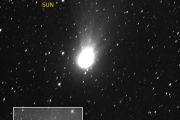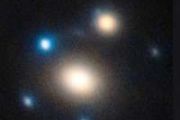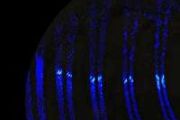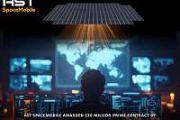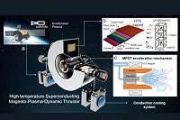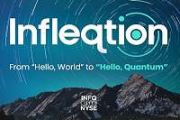
Copernical Team
Europe needs reusable rockets to catch Musk's SpaceX: ESA chief
 Europe must quickly get its own reusable rocket launcher to catch up to billionaire Elon Musk's dominant SpaceX, European Space Agency director Josef Aschbacher told AFP in an interview.
While the US company has an overwhelming lead in the booming space launch industry, a series of setbacks, including Russia's withdrawal of its rockets, left Europe without an independent way to blast its mis
Europe must quickly get its own reusable rocket launcher to catch up to billionaire Elon Musk's dominant SpaceX, European Space Agency director Josef Aschbacher told AFP in an interview.
While the US company has an overwhelming lead in the booming space launch industry, a series of setbacks, including Russia's withdrawal of its rockets, left Europe without an independent way to blast its mis SpaceX targets nighttime launch of competitor Amazon's satellites
This request seems a bit unusual, so we need to confirm that you're human. Please press and hold the button until it turns completely green. Thank you for your cooperation!
Press and hold the button
If you believe this is an error, please contact our support team.
185.132.36.159 : fc9b1a3c-1806-42c9-833c-a649643f
Eyes in the sky: Making Earth observation data work for people
This request seems a bit unusual, so we need to confirm that you're human. Please press and hold the button until it turns completely green. Thank you for your cooperation!
Press and hold the button
If you believe this is an error, please contact our support team.
185.132.36.159 : b02ac569-2a82-4702-9e48-7bbb553f
Ensuring the accuracy of ESA’s FORUM climate mission

The European Space Agency’s upcoming FORUM mission is set to provide unique insights into Earth’s radiation budget, filling in a missing piece in the climate puzzle. The mission’s spectrometer will be the first space-based instrument to measure Earth’s outgoing radiation in the far-infrared part of the electromagnetic spectrum with unprecedented resolution and accuracy. New technologies were needed to make this possible – among these an on-ground calibration device developed by the National Metrology Institute of Germany PTB within a recent activity funded by ESA’s General Support Technology Programme. This device is used
Water signature detected in interstellar comet 3I ATLAS
 A fragment of ancient ice and dust from another star system has arrived in our cosmic neighborhood as 3I/ATLAS, only the third interstellar comet ever found. Using NASA's Neil Gehrels Swift Observatory, Auburn University physicists detected hydroxyl gas, the ultraviolet by-product of water, confirming active water release from this visitor.
Swift's vantage point above Earth's atmosphere en
A fragment of ancient ice and dust from another star system has arrived in our cosmic neighborhood as 3I/ATLAS, only the third interstellar comet ever found. Using NASA's Neil Gehrels Swift Observatory, Auburn University physicists detected hydroxyl gas, the ultraviolet by-product of water, confirming active water release from this visitor.
Swift's vantage point above Earth's atmosphere en General purpose AI classifies transient cosmic events from just a few examples
 A study co-led by the University of Oxford, Google Cloud and Radboud University shows a general-purpose large language model, Google's Gemini, can identify real celestial changes and explain its reasoning using only 15 example image triplets and brief instructions, achieving about 93% accuracy across ATLAS, MeerLICHT and Pan-STARRS alerts.
The workflow ingests New, Reference and Difference
A study co-led by the University of Oxford, Google Cloud and Radboud University shows a general-purpose large language model, Google's Gemini, can identify real celestial changes and explain its reasoning using only 15 example image triplets and brief instructions, achieving about 93% accuracy across ATLAS, MeerLICHT and Pan-STARRS alerts.
The workflow ingests New, Reference and Difference Webb reveals carbon rich disc around giant exoplanet
 NASA's James Webb Space Telescope has captured the first detailed measurements of a circumplanetary disc that may serve as a birthplace for moons around a massive exoplanet. The discovery, involving the companion world CT Cha b located 625 light years away, sheds light on how Jupiter's Galilean satellites may have emerged more than four billion years ago.
The international team used Webb's
NASA's James Webb Space Telescope has captured the first detailed measurements of a circumplanetary disc that may serve as a birthplace for moons around a massive exoplanet. The discovery, involving the companion world CT Cha b located 625 light years away, sheds light on how Jupiter's Galilean satellites may have emerged more than four billion years ago.
The international team used Webb's Computer models point to crew diversity as key to resilient Mars missions
 Simulation results from Stevens Institute of Technology researchers Iser Pena and Hao Chen indicate that who you send to Mars matters as much as what you send. Published October 8, 2025 in PLOS One, the study used agent-based modeling to probe how personality mix and team roles shape stress, health, performance, and cohesion over a simulated 500-day mission.
The model linked individual dif
Simulation results from Stevens Institute of Technology researchers Iser Pena and Hao Chen indicate that who you send to Mars matters as much as what you send. Published October 8, 2025 in PLOS One, the study used agent-based modeling to probe how personality mix and team roles shape stress, health, performance, and cohesion over a simulated 500-day mission.
The model linked individual dif University of Mississippi Law School launches first fully online Air and Space Law master's degree
 The University of Mississippi School of Law has introduced the nation's first fully online Master of Science in Air and Space Law, designed to equip professionals for leadership roles in the fast-growing aerospace sector. Created in collaboration with instructional design firm iDesign, the program delivers a comprehensive legal foundation for those working in aviation, commercial space, and emer
The University of Mississippi School of Law has introduced the nation's first fully online Master of Science in Air and Space Law, designed to equip professionals for leadership roles in the fast-growing aerospace sector. Created in collaboration with instructional design firm iDesign, the program delivers a comprehensive legal foundation for those working in aviation, commercial space, and emer Trump jeopardising US role as scientific leader: Nobel officials
 Donald Trump's assault on science could threaten the United States' position as the world's leading research nation and have knock-on effects worldwide, Nobel Prize officials in Sweden told AFP.
Since taking office in January, the US president has cut billions of dollars in funding, attacked universities' academic freedoms and overseen mass layoffs of scientists across federal agencies.
Donald Trump's assault on science could threaten the United States' position as the world's leading research nation and have knock-on effects worldwide, Nobel Prize officials in Sweden told AFP.
Since taking office in January, the US president has cut billions of dollars in funding, attacked universities' academic freedoms and overseen mass layoffs of scientists across federal agencies. 














